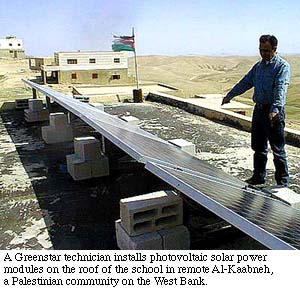|
Michael North
The international IT market is not really international. Over 1/3 of the world's population, in 600,000 communities, is being permanently excluded from the global e-commerce opportunity by the leading IT giants. Can any industry expect to prosper, long-term, if it ignores more than a third of its potential market? We're talking about those parts of the developing world that are off the conventional power grid, without electricity and often without phone service. These are rural communities where computers and Web connections are unknown -- and where basic health, education, water, and social services are often lacking as well. In these places, which exist everywhere throughout Africa, Asia, South America, the Middle East -- and even in pockets in North America, Europe, and the former USSR, the economy is based primarily on local production and barter, not on cash. Investments to date by the IT industry in emerging markets emphasize urban areas almost exclusively, leaving these huge rural markets in a permanent economic twilight zone. Is it smart for business to ignore billions of people as potential producers and markets? At Greenstar, we think not. . .but the obstacles to wiring people in these communities so that they can join the global e-commerce market are significant. Inexpensive electricity is the base requirement. But the cost of a Western-style centralized power grid, with its huge power plants and transformers, miles of copper, poles and trenches, and a system of meters and billing, is simply not economically justifiable for such widely-dispersed populations. To deliver electricity to 600,000 new communities would stretch the available physical copper reserves of the planet, making the job virtually impossible. . .even if it could be economically justified. [See http://www.greenstar.org/why.htm#anchor1615744 for discussion of this topic from the Rockefeller Brothers Fund.] The rewards, however, could be huge. Basic electrical power ("dumb electrons") can be converted into a powerful economic force ("smart electrons"), using computers, software, data networks, e-commerce, and local entrepreneurial initiative as a transformation engine.  Technology is available, which requires no capital-intensive centralized power grid, no resource-intensive distribution network, and no local meter monitoring. It's not new, its capabilities are well-understood, and it's in use now in thousands of locations worldwide. That technology is solar photovoltaics, which Greenstar is using to generate dumb voltage electrons for conversion into smart e-commerce electrons. With about $25,000 worth of solar panels, we recently electrified a school and community center in a remote, off-the-grid village in Palestine. Each panel measures about 4 ft. by 8 ft., and an array of eight panels mounted on the school roof easily powers lights, a copier, a multimedia computer, and soon a satellite dish and water purifier. [See http://www.greenstar.org/photobook/ for photos and a basic description of this installation, in Al-Kaabneh.]  But with support costs, electrical converters and batteries, this installation is expensive, and could not be justified for pushing dumb electrons only. Where the equation gets interesting is when you add e-commerce into the mix. Greenstar has helped to identify an array of local products which can be offered on the world market by this Palestinian community. They include musical instruments, pottery, ceramics, glassware, and tapestries that are unique to the area, carry special historical significance because of their origin in the Dead Sea area, and will be of interest to 150 million worldwide Web consumers because they can be in direct contact with the people who produce the products, and because they're part of a renewable energy project. [See http://www.greenstar.org/March99/products.htm for a view of this product family.] Our initial projections for revenue from a professionally-marketed e-commerce site hosted by this village show that not only can the equipment and operations be paid for in a reasonable time period, but that additional health and education services can be supported, and that a new source of hard, international currency through exports can be produced by the people. All this needs to be done in a culturally sensitive way, with maximum control by the local community, for it to work and be self-sustaining in the long run. The Greenstar program, emphasizing locally-produced products that are marketed internationally, will strengthen traditional communities by giving young people a reason to stay at home and invest their fresh energies in the future, rather than leave and become nameless serfs in a third-world urban megalopolis.[See http://www.greenstar.org/ pressroom/JPost.htm for an example of the positive response this approach receives.] For first-world business, the opportunity is clear. Opening new markets, with new products and an earth-friendly marketing message, can be profitable for those who invest in the infrastructure, as well as for the producers of the products. And when people in off-the-grid communities get onto the global e-commerce grid and start earning real income, they become new markets for global products themselves; the companies that invest in the infrastructure will have strategic first mindshare among these billions of new consumers. It's a huge job, and will take years to expand to a global scale. The risks are great, and the challenges (many of them political) are significant...all the more reason why it's important to start now, with a carefully-selected strategic set of locations, before these developing communities fall even further off the grid. It's not only the smart thing to do, it's the right thing to do. . .an investment in human infrastructure, in peace and growth into the third millennium. Released: May 21, 1999 © Copyright 1999, Michael North. All Rights Reserved.
|
